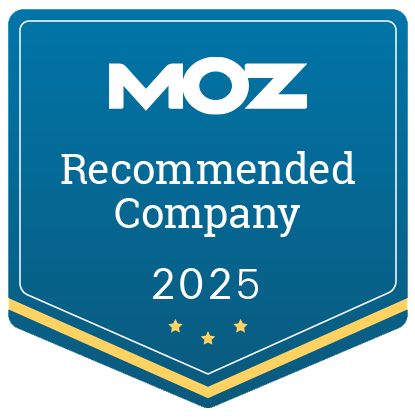Search Engine Optimization (SEO) can be broken down into three main categories: On-Page SEO, Off-Page SEO, and Technical SEO. Each type of SEO focuses on different aspects of your website's performance and visibility, ensuring a comprehensive approach to increasing your site's search engine rankings. By mastering all three types, you can significantly improve your website’s presence and user experience.
On-Page SEO focuses on the content and structure within your website, including keyword usage, meta descriptions, and internal linking. Technical SEO addresses the backend elements of your site, such as site speed, mobile-friendliness, and indexing. These components help search engines effectively crawl and understand your site, which is crucial for better ranking.
Off-Page SEO, on the other hand, involves activities outside your website to boost its authority and reputation. This includes building high-quality backlinks, social media engagement, and online PR. Using all three SEO strategies creates a robust framework that enhances your website's performance and drives more organic traffic.
Introduction To SEO
Search Engine Optimization (SEO) is the practice of optimizing your website to increase its visibility on search engines like Google. A good SEO strategy can drive organic traffic to your site, improving your chances of reaching your target audience.
Three primary SEO strategies are On-Page SEO, Off-Page SEO, and Technical SEO. Each plays a crucial role in ensuring your website ranks well in search results.
On-Page SEO concerns the content and structure of your site’s pages. It includes keyword optimization, meta tags, and ensuring your content is relevant and valuable to users.
Off-Page SEO involves actions taken outside of your website to impact your rankings. This primarily includes building high-quality backlinks from reputable sites and managing your online reputation.
Technical SEO focuses on the backend aspects of your site. Technical SEO includes improving site speed, mobile compatibility, and ensuring search engines can crawl and index your pages efficiently.
Understanding these different aspects and how to implement them effectively is essential for a comprehensive SEO strategy. It’s not just about keyword stuffing or link building; it’s about creating a well-rounded, easily accessible, and valuable resource for your users.
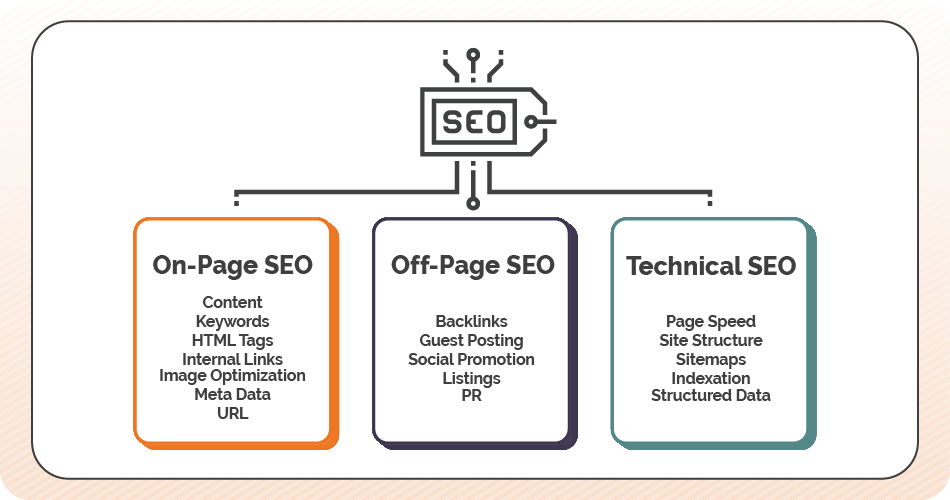
What Is On-Page SEO
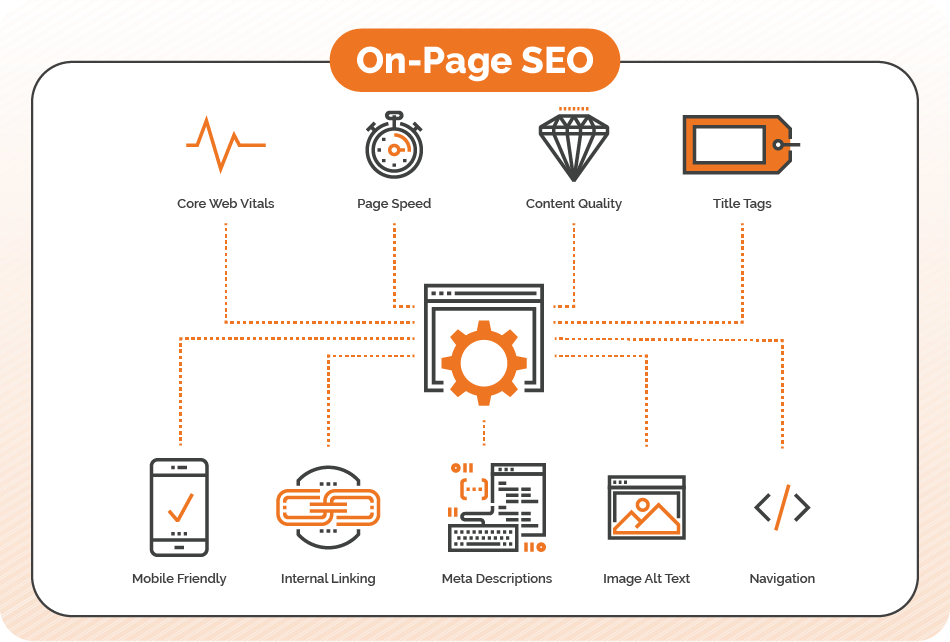
On-Page SEO involves optimizing individual web pages to rank higher and earn more relevant traffic. It includes various techniques and elements directly controlled by you.
Aspects Of On-Page SEO
Content Quality: High-quality, informative content is crucial. Ensure content is original, valuable, and includes relevant keywords naturally. Use headings and subheadings (H1, H2, H3) to structure the content.
Title Tags: Title tags are important for search engines and users. Craft concise and descriptive titles with primary keywords near the beginning. It is recommended to keep the character count between 55–70 characters.
Meta Descriptions: Meta descriptions provide a brief summary of a page’s content. Write unique and compelling descriptions between 145–160 characters, incorporating keywords to improve click-through rates.
Header Tags: Use header tags (H1, H2, H3) to structure your content hierarchically, improving readability for users and helping search engines understand the organization of your information.
URL Structure: Use clear, descriptive URLs that include keywords. Avoid lengthy URLs and special characters.
Internal Linking: Link to other relevant pages on your site to improve navigation and help search engines understand your site’s structure. Use keyword-rich anchor text.
Image Optimization: Optimize images by using descriptive filenames, alt text, and appropriate file sizes to enhance page load speed.
Mobile Friendliness: Ensure your site is responsive and mobile-friendly, as a significant portion of users access websites via mobile devices.
Page Speed: Fast-loading pages improve user experience and search engine rankings. Compress images, leverage browser caching, and minimize code.
User Engagement: Focus on creating engaging content that encourages user interaction, such as comments, social shares, and longer time on page.
What Is Off-Page SEO
Off-Page SEO involves all the activities done outside your own website to improve its ranking in search engine results. Off-page SEO is an incredible way to boost your online reputation and provide significant benefits. This includes building backlinks, social media marketing, and brand mentions.
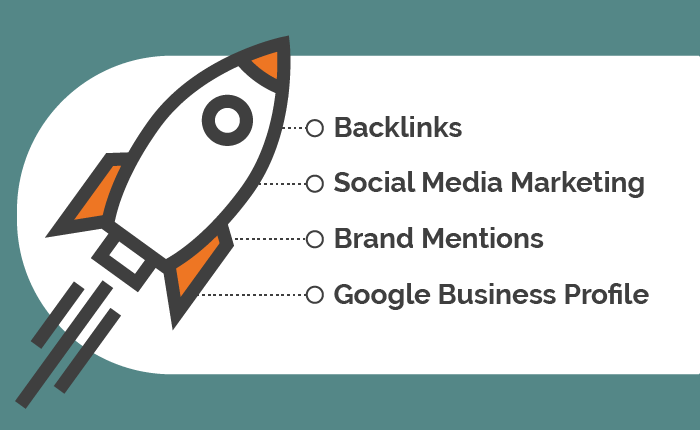
Aspects Of Off-Page SEO
Backlinks
Backlinks are links from other websites to your site. They are critical because search engines see them as endorsements. More high-quality backlinks generally indicate a more credible and authoritative site. Focus on acquiring them from reputable websites in your niche.
Social Media Marketing
Social media marketing efforts can drive traffic and create brand awareness. Engaging with your audience on these platforms can lead to shares, likes, and comments, which indirectly benefit your site's ranking. Consistent activity can help establish authority and engagement.
Brand Mentions
Brand mentions are when your brand or website name is mentioned on other sites without a hyperlink. These can still positively impact your SEO. Search engines monitor these mentions and may consider them when determining your site's credibility and relevance. Implementing a strategy to find unlinked brand mentions and reaching out to acquire a backlink will increase your digital presence and reputation.
What Is Technical SEO
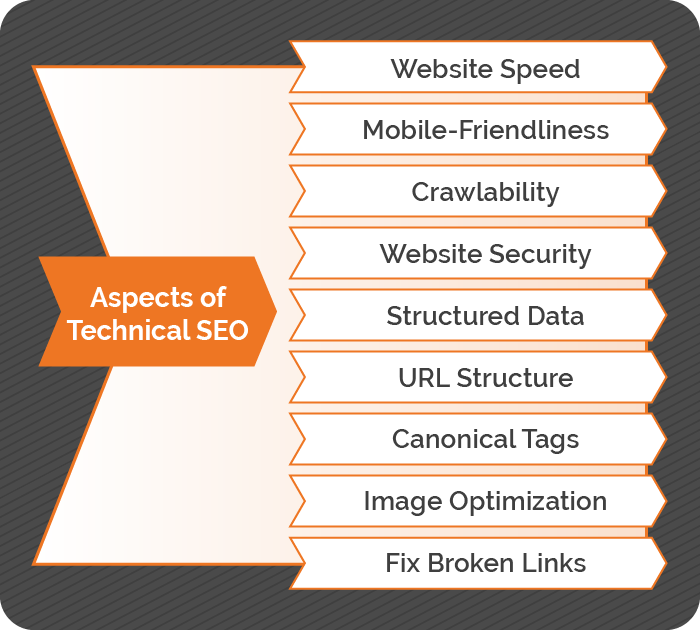
Technical SEO focuses on optimizing your website for crawling and indexing by search engines. It involves improving website infrastructure to enhance user experience and search visibility.
Aspects Of Technical SEO
Website Speed: Faster loading times improve user experience and search engine rankings. Tools like Google PageSpeed Insights can help you identify and fix speed issues.
Mobile-Friendliness: Your website must be responsive and easy to navigate on mobile devices. Google’s Mobile-Friendly Test can determine if your site meets mobile usability standards.
Crawlability: Ensure search engines can crawl your website efficiently. Use robots.txt files to guide search engine bots and create an XML sitemap to help them find your content.
SSL Certificate: Secure your website with HTTPS to protect user data and improve trust. Google considers HTTPS a ranking factor, making it crucial for SEO.
Structured Data: Implement schema markup to help search engines understand your content better. This can enhance your search results with rich snippets and improve click-through rates.
Fixing Broken Links: Regularly check for and fix broken links. These can harm user experience and negatively impact your search engine rankings.
URL Structure: Use clean and descriptive URLs. Avoid long, complicated URLs with unnecessary parameters as they can confuse both users and search engines.
Canonical Tags: Prevent duplicate content issues by using canonical tags. These tags help search engines understand the preferred version of a webpage.
By addressing these technical SEO aspects, you can optimize your website’s infrastructure for both users and search engines, leading to better performance and higher rankings.
On-Page SEO Vs Off-Page SEO
On-Page SEO focuses on optimizing elements within your website. This includes:
- Title Tags: Crafting relevant and compelling titles for each page.
- Meta Descriptions: Writing descriptive summaries that appear in search results.
- Headings: Structuring content with appropriate headers.
- Content Quality: Ensuring your content is valuable, relevant, and engaging.
- Internal Links: Linking to other pages within your site to improve navigation.
By enhancing these on-page SEO elements, your site becomes more attractive to search engines and users.
Off-Page SEO refers to actions taken outside your website to impact your rankings. Important elements include:
- Backlinks: Acquiring links from other reputable websites.
- Social Signals: Engaging your audience on social media platforms.
- Influencer Outreach: Collaborating with influential figures in your industry.
- Guest Blogging: Writing articles for other websites to increase exposure.
Including an off-page SEO strategy helps build your site's authority and trustworthiness.
Comparison Table: On-Page vs Off-Page SEO
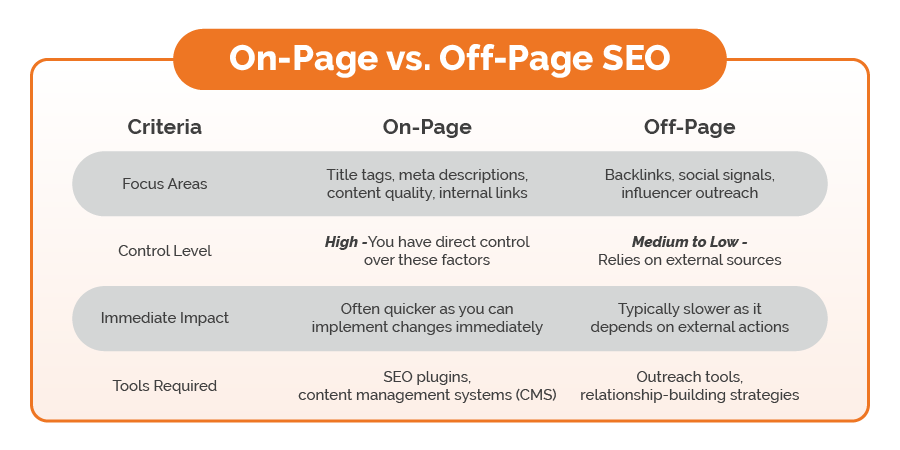
On-Page SEO Vs Technical SEO
On-Page SEO focuses on optimizing elements within your website to improve search engine rankings. This includes E-E-A-T content, meta tags, images, and internal links. It's about making your site relevant and compelling for your target audience.
Technical SEO, on the other hand, deals with the backend structure of your site. It ensures that search engines can crawl and index your pages efficiently. This includes website speed, mobile-friendliness, and secure connections (HTTPS).
Comparison Table: On-Page vs Technical SEO
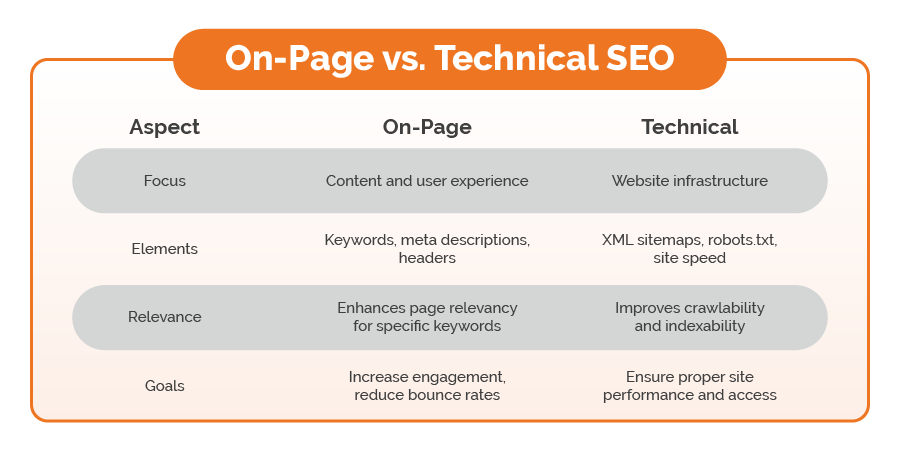
Important Factors
On-Page SEO:
- Content Quality: High-quality, relevant content that satisfies user intent.
- Meta Tags: Proper titles and descriptions that improve click-through rates.
- Image Optimization: Alt tags and appropriate file sizes to improve load times.
Technical SEO:
- Site Speed: Fast-loading pages for better user experience and rankings.
- Mobile-Friendliness: Responsive design to ensure usability across devices.
- Secure Connections: Implementing HTTPS to protect user data and boost trust.
Understanding the distinctions between On-Page and Technical SEO can help you optimize your site for both users and search engines. Make sure to balance both to create a comprehensive SEO strategy.
Off-Page SEO Vs Technical SEO
Off-Page SEO focuses on activities outside your website to improve its search engine rankings. These activities include building backlinks, social media engagement, and brand mentions. Backlinks from reputable sites can significantly boost your domain authority.
Technical SEO involves optimizing your website's infrastructure. This includes tasks like improving site speed, ensuring mobile-friendliness, and securing your site with HTTPS. Proper technical SEO enhances crawlers' ability to index your site effectively.
Comparison Table: Off-Page vs Technical SEO
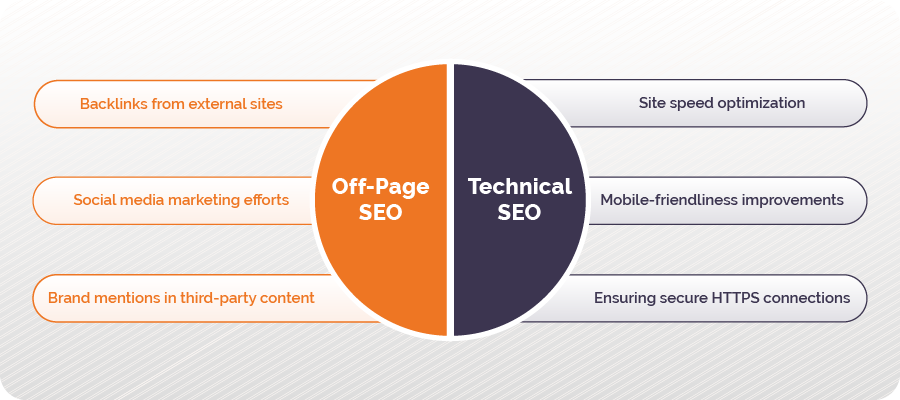
Off-Page SEO helps establish your online presence and credibility. For instance, a backlink from a high-authority site helps in improving trustworthiness.
Technical SEO ensures your website is easily accessible and functional. For example, having a fast-loading site improves user experience, impacting your rankings positively.
By enhancing your off-page SEO efforts, you make your website more attractive and credible to search engines.
By focusing on technical aspects, you make it easier for search engines to crawl and index your site.
Combining both is crucial. Without solid technical SEO, off-page efforts might not achieve their full potential.
How To Use All Three Pillars Of SEO
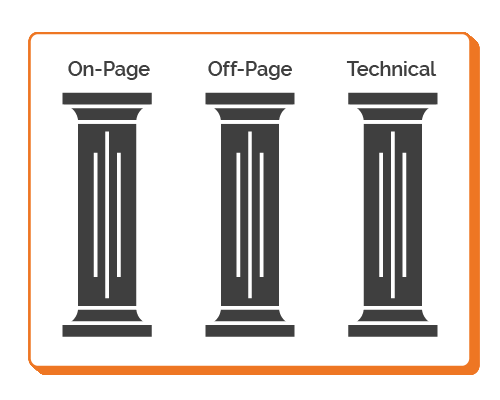
On-Page SEO targets content optimization. Each page should have unique, keyword-rich titles and meta descriptions. Utilize header tags (H1, H2, H3) for structure and incorporate internal linking to improve navigation.
Off-Page SEO involves building authority. High-quality backlinks are essential. Engage in guest blogging, social media marketing, and influencer outreach to generate natural links.
Technical SEO focuses on site infrastructure. You should ensure your website is fast, mobile-friendly, and easily crawlable by search engines. Use tools like Google Search Console to monitor indexing issues and improve your XML sitemap.
A balanced approach incorporating On-Page, Off-Page, and Technical SEO will enhance your website’s visibility and rankings. While each pillar has its own benefits, utilizing all three will put you ahead of the competition.
Achieve The Perfect Mixed SEO Strategy
To achieve an effective and winning SEO strategy, integrating on-page, off-page SEO, and technical is crucial.
On-Page SEO centers on content and HTML elements. Optimize title tags, meta descriptions, and headers with relevant keywords. Create engaging, high-quality content that meets user search intent. Use internal links to improve site navigation.
Off-Page SEO involves external factors. Build high-quality backlinks from reputable sites. Engage in social media marketing and guest posting to increase your site's visibility and credibility.
Technical SEO focuses on the backend infrastructure. Ensure your website is mobile-friendly, has a fast loading speed, and a secure HTTPS connection. Use a reliable hosting service to minimize downtime.
Combining these approaches ensures comprehensive optimization. Monitor and analyze your site's performance using tools like Google Analytics and Search Console. Continuously refine your strategy based on data insights.
Build Your Successful SEO Strategy
A comprehensive SEO strategy requires a balanced approach that integrates On-Page SEO, Off-Page SEO, and Technical SEO. By understanding and optimizing each of these components, you can create a website that ranks well, attracts organic traffic, and provides a superior user experience. If you’re ready to take the next step in digital marketing, mastering these SEO pillars is essential for long-term digital success. Reach out to a professional digital marketing agency, like Zero Gravity Marketing, to achieve SEO success.





